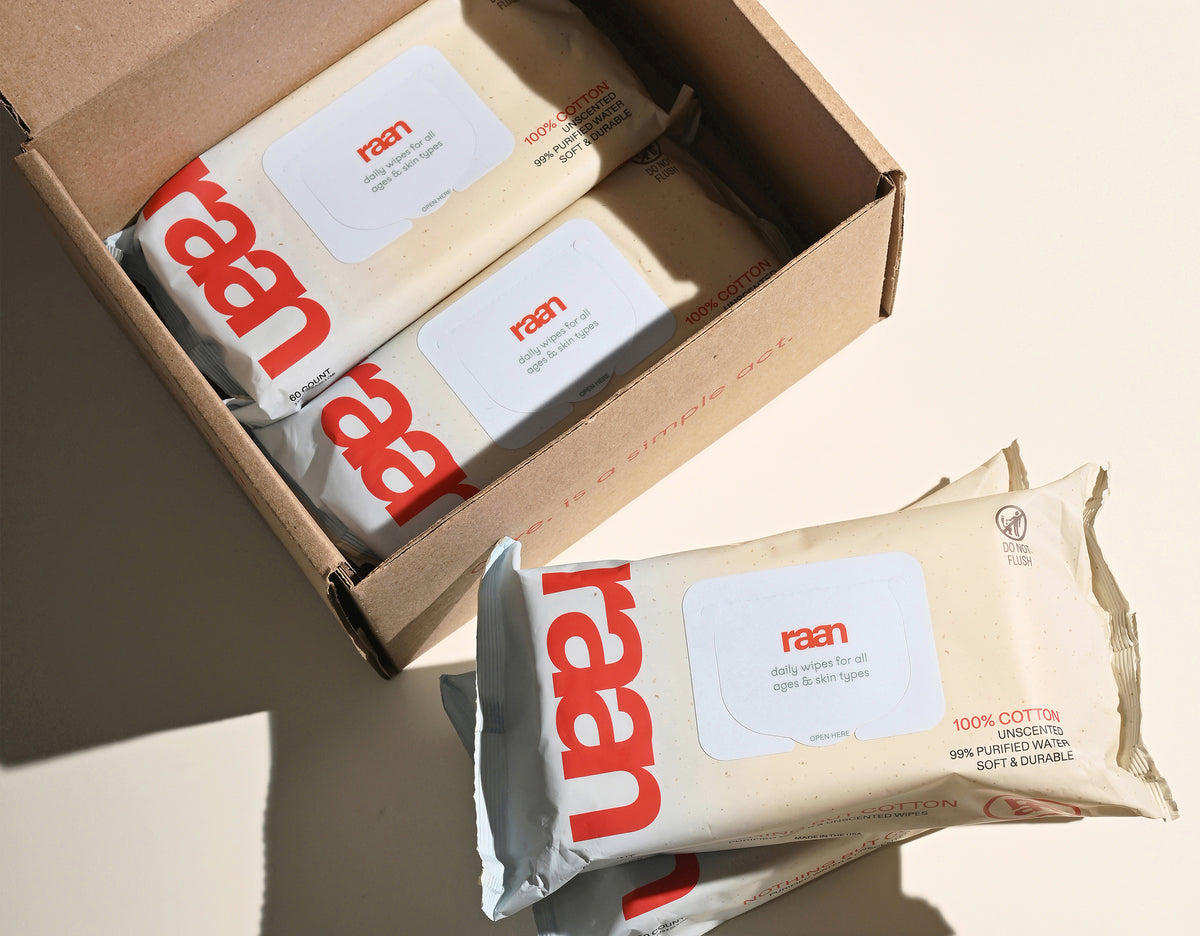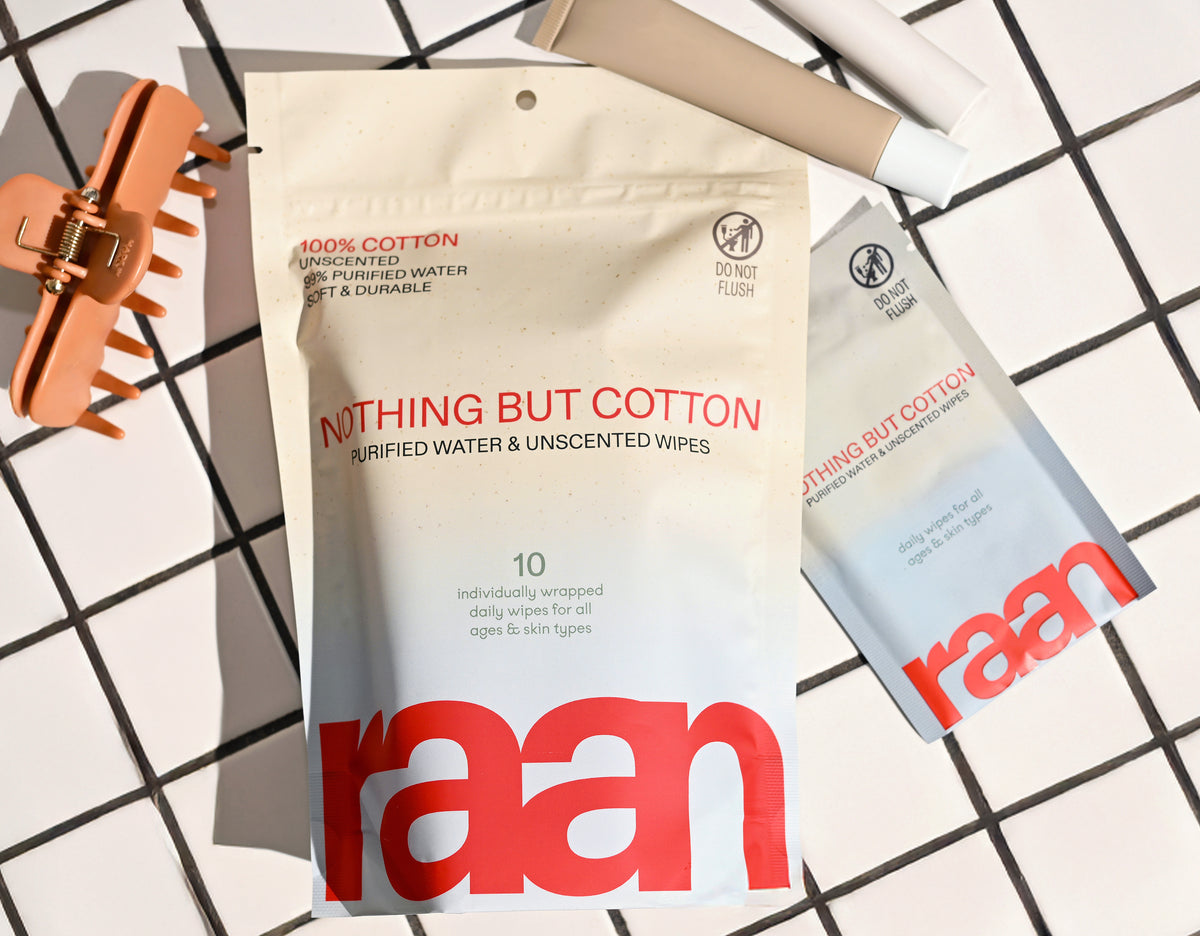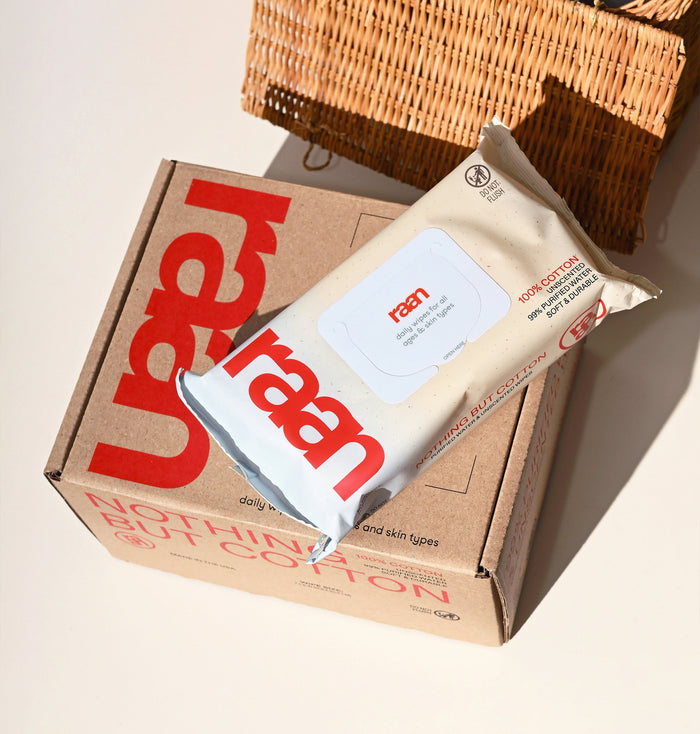Key Takeaways
- The best natural baby wipes use unbleached cotton and contain minimal, EWG-verified ingredients.
- Raan wipes stand out with only five ingredients and 100% cotton without plastic fibers or synthetic fragrances.
- Many wipes labeled "natural" still include plastic fibers and synthetic preservatives that can irritate sensitive skin.
- Transparency in materials and ingredient lists is essential for truly natural baby wipes.
- Choosing wipes with simple, pronounceable ingredients ensures safer care for baby skin.
Table of Contents
- Why "Natural" Baby Wipes Matter for Sensitive Skin and Everyday Messes
- The Science of Simpler Ingredients, What's Inside (and What's Not)
- Decoding "Natural," "Organic," and "Biodegradable", What Do These Labels Really Mean?
- Natural Baby Wipes vs. Conventional Wipes, Real-World Comparison
- How to Choose the Best Natural Baby Wipes, A Practical, No-Jargon Guide
- Everyday Ways to Use Natural Baby Wipes Beyond the Changing Table
- Certifications and Safety, What to Look for (and What Emblems Really Mean)
- Comparing the Best, 2025's Top Natural Baby Wipes Brands, Features, and Use Cases
Best Natural Baby Wipes, Safe, Simple, and Honest Choices for Families
Finding truly natural baby wipes means cutting through marketing claims to discover what's actually touching your baby's skin. Most "natural" wipes still contain plastic fibers, synthetic preservatives, and vague ingredient lists that leave parents guessing. The best natural baby wipes prioritize material transparency, minimal processing, and ingredients you can pronounce, because baby skin deserves nothing less than honest care.
Real natural wipes start with the fabric itself. Unbleached cotton provides gentle cleansing without the microplastics found in conventional wipes, while simplified formulas reduce the risk of irritation and allergic reactions that plague sensitive skin.
Why "Natural" Baby Wipes Matter for Sensitive Skin and Everyday Messes
Baby skin is 30% thinner than adult skin and absorbs substances up to five times faster. This increased permeability means whatever touches your baby's skin, including wipe ingredients, gets absorbed more readily into their developing system.
Conventional wipes often contain synthetic fragrances, alcohol-based preservatives, and plastic fibers that can trigger contact dermatitis, diaper rash, and long-term skin sensitivity. The cumulative effect of daily exposure to these additives creates a chemical burden that natural alternatives help avoid. For more on how to choose the safest options, see our best baby wipes for sensitive skin guide.
- Unbleached, plastic-free fabric (cotton or bamboo)
- Minimal ingredient list with clear purposes
- Food-grade or naturally-derived preservatives only
- Third-party safety certifications (EWG Verified, dermatologist-tested)
- No synthetic fragrances, parabens, or chlorine processing
True natural wipes protect developing skin barriers while handling real-world messes effectively. They clean without compromising the skin's natural pH balance or stripping protective oils that prevent irritation.
The Science of Simpler Ingredients, What's Inside (and What's Not)

The most effective natural baby wipes prove that fewer ingredients often mean better performance and safety. Raan's formula contains just five EWG-verified ingredients on 100% unbleached cotton: purified water (99% of the solution), organic aloe for moisture, sodium benzoate and potassium sorbate as food-grade preservatives, ethylhexylglycerin for skin conditioning, and citric acid for pH balance.
| Conventional Wipe Additives | Purpose | Natural Alternative |
|---|---|---|
| Synthetic fragrances | Scent masking | Unscented or naturally derived scents |
| Parabens | Preservation | Food-grade preservatives |
| Plastic fibers | Durability | 100% cotton or bamboo |
| Chlorine bleaching | Whitening | Unbleached natural fibers |
| Alcohol | Quick-drying | Water-based formulation |
Each ingredient in quality natural wipes serves a specific, necessary function. Purified water provides the cleansing action, while organic aloe soothes and moisturizes without synthetic emollients. Food-grade preservatives prevent bacterial growth using the same compounds found in safe foods, eliminating the need for harsh chemical alternatives.
This simplified approach reduces the likelihood of allergic reactions while maintaining effective cleaning power. When you can identify every ingredient and understand its purpose, you're choosing transparency over marketing complexity.
For a deeper dive into ingredient safety and what to avoid, check out our best baby wipes non toxic resource.
Decoding "Natural," "Organic," and "Biodegradable", What Do These Labels Really Mean?
Natural means ingredients derived from plants, minerals, or other naturally occurring sources with minimal processing. However, this term isn't regulated, so brands can apply it loosely. Organic requires USDA certification for agricultural ingredients, ensuring no synthetic pesticides or GMOs. Biodegradable indicates the product breaks down naturally, but timelines vary drastically, from weeks to years depending on conditions.
Greenwashing occurs when brands use environmental buzzwords without substance. Phrases like "eco-friendly" or "naturally inspired" often mask conventional formulations with one or two natural ingredients added for marketing appeal.
Green Flag Language: "100% cotton," "EWG Verified," "USDA Organic aloe," specific ingredient percentages
Legitimate certifications require rigorous testing and ongoing compliance. EWG Verified means every ingredient meets the Environmental Working Group's strictest safety standards. Natural Cotton certification ensures fibers are grown and processed without synthetic pesticides or bleaching agents. This matters because conventional cotton processing often involves chlorine bleaching and chemical softeners that can remain in the final product.
Natural Baby Wipes vs. Conventional Wipes, Real-World Comparison
The divide between natural and conventional baby wipes runs deeper than marketing claims. When you examine materials, ingredients, and manufacturing processes side-by-side, the differences become clear, and they matter for your family's daily routine.
Conventional wipes typically use synthetic materials like polyester or polypropylene blends, which contain microplastics that don't break down. These plastic fibers can irritate sensitive skin and contribute to environmental waste. Natural wipes, like Raan's unbleached, 100% cotton option, use earth-derived materials that are gentler on skin and biodegradable.
| Criteria | Natural Wipes (Raan) | Conventional Wipes |
|---|---|---|
| Material | Unbleached, 100% cotton | Synthetic plastic blends |
| Ingredient Count | 5 EWG-verified ingredients | 15-30+ additives |
| Preservatives | Food-grade sodium benzoate | Synthetic phenoxyethanol, parabens |
| Packaging Plastic | 70% less plastic (no hard lid) | Full plastic containers |
| Biodegradability | Cotton breaks down naturally | Plastic fibers persist indefinitely |
The ingredient complexity tells the story. While conventional wipes often contain fragrances, alcohol, and synthetic preservatives that can trigger reactions, the best natural baby wipes focus on simplicity. Raan's formula contains just purified water, organic aloe, and three food-grade ingredients, each serving a clear purpose without unnecessary additives.
For more on the differences between wipe types, see our best baby wipes comparison.
How to Choose the Best Natural Baby Wipes, A Practical, No-Jargon Guide

Shopping for natural baby wipes shouldn't require a chemistry degree. Start with the ingredient list, if you can't pronounce half the ingredients or the list runs longer than ten items, keep looking. The best natural baby wipes prove that less is more effective.
Look for specific material claims, not vague promises. "100% cotton" means something concrete. "Natural-inspired" or "plant-based blend" often masks synthetic materials. Check for third-party certifications like EWG Verified, which requires independent testing of every ingredient for safety.
Red Flag Ingredients to Avoid:
- Phenoxyethanol (synthetic preservative)
- Fragrance or parfum (potential allergens)
- Alcohol or ethanol (drying, irritating)
- Benzalkonium chloride (harsh antimicrobial)
- Propylene glycol (synthetic solvent)
For babies with eczema or ultra-sensitive skin, test any new wipe on a small patch of skin first. Even natural ingredients can cause reactions in some children. Store opened packages properly, natural wipes without harsh preservatives can dry out faster than conventional options, but they shouldn't develop mold if stored correctly.
When comparing costs, calculate price per wipe rather than per package. Natural wipes often come in smaller quantities but deliver better value through gentler, more effective cleaning that requires fewer wipes per use. If you're looking to try a variety, consider the starter set for a convenient introduction to natural wipes.
Everyday Ways to Use Natural Baby Wipes Beyond the Changing Table
Natural baby wipes earn their place in your routine far beyond diaper changes. Their gentle, minimal-ingredient formulas make them perfect for face and hand cleaning throughout the day, something you'd never want to do with harsh conventional wipes.
New parents quickly discover that best natural baby wipes become their go-to for sticky fingers after meals, playground dirt, and even their own quick skincare refresh. The unbleached cotton material feels soft enough for facial use, while the simple ingredient list won't clog pores or irritate adult skin.
Pet owners love natural wipes for cleaning paws after walks and gentle coat maintenance. The same qualities that make them safe for baby skin, no harsh chemicals, no synthetic fragrances, make them ideal for animals who groom themselves. Travel scenarios call for natural wipes too: airplane tray tables, restaurant high chairs, and hotel surfaces all get cleaner without exposing your family to additional chemicals.
Keep a pack in your car, diaper bag, and kitchen. Unlike conventional wipes designed solely for diaper duty, natural cotton wipes handle everything from makeup touch-ups to cleaning phone screens without leaving residue or causing irritation. For more everyday tips, see our best wipes roundup.
Certifications and Safety, What to Look for (and What Emblems Really Mean)
Third-party certifications cut through marketing noise to deliver verified safety standards. EWG Verified certification requires rigorous testing of every ingredient against the Environmental Working Group's database of over 80,000 chemicals. Products that earn this certification undergo ongoing compliance monitoring, not just a one-time approval.
Natural Cotton certification ensures fibers are grown and processed without synthetic pesticides or bleaching agents. This matters because conventional cotton processing often involves chlorine bleaching and chemical softeners that can remain in the final product. Women Owned and Cruelty Free certifications further demonstrate a commitment to ethical sourcing and manufacturing practices.
Comparing the Best, 2025's Top Natural Baby Wipes Brands, Features, and Use Cases

The best natural baby wipes market offers several thoughtful options, each with distinct approaches to ingredient transparency, material sourcing, and skin safety. Here's how the leading brands measure up on what matters most for sensitive skin and everyday messes.
| Brand | Material | Key Ingredients | Certifications | Packaging Impact |
|---|---|---|---|---|
| Raan | 100% unbleached cotton | 5 EWG-verified (99% water, organic aloe) | EWG Verified, Natural Cotton, Women Owned | 70% less plastic than standard |
| Coterie | Plant-based fiber blend | 99.5% water, chamomile extract | Dermatologist tested | Standard plastic packaging |
| Pipette | Plant-based viscose | 99% water, organic calendula | EWG Verified, Hypoallergenic | Recyclable outer packaging |
| Hello Bello | Plant-based fibers | 99.9% water, aloe vera | Hypoallergenic | Standard packaging |
Raan Cotton Wipes, Material Transparency Meets Function
Best for: Families demanding complete ingredient clarity and plastic-free materials
Raan stands apart with genuinely unbleached, 100% cotton construction, no synthetic fibers, no plastic microfibers, no processing shortcuts. The five-ingredient formula uses only EWG-verified components: purified water, food-grade preservatives (sodium benzoate, potassium sorbate), skin-conditioning ethylhexylglycerin, organic aloe, and citric acid for pH balance.
What sets this apart is material honesty. While other brands use "plant-based" viscose (which requires chemical processing), Raan sources natural cotton and skips bleaching entirely. The packaging reduces plastic waste by 70% compared to hard-lid containers, using a pouch with 35% post-consumer content. For families on the go, the pocket wipe for sensitive skin offers convenient, individually wrapped wipes.
Coterie, Premium Gentle Approach
Best for: Parents prioritizing ultra-soft texture and chamomile benefits
Coterie focuses on creating an exceptionally soft wipe experience through plant-based fiber blending. Their 99.5% water formula includes chamomile extract, known for soothing properties. The brand emphasizes dermatologist testing and premium feel.
- Exceptionally soft texture
- Chamomile for gentle soothing
- Dermatologist tested
- Plant-based fibers may include processed materials
- Standard plastic packaging
- Higher price point
Pipette, EWG Verified with Calendula
Best for: Eco-conscious families wanting EWG verification with botanical ingredients
Pipette earns EWG Verified status with a 99% water formula enhanced by organic calendula. Their plant-based viscose material offers durability while maintaining hypoallergenic standards.
- EWG Verified ingredients
- Organic calendula inclusion
- Recyclable outer packaging
- Viscose requires chemical processing
- Limited ingredient transparency details
Hello Bello, Accessible Natural Option
Best for: Budget-conscious families seeking natural ingredients without premium pricing
Hello Bello delivers 99.9% water content with aloe vera in an affordable package. Their plant-based fiber approach makes natural wipes more accessible to mainstream families.
- Budget-friendly pricing
- High water content
- Widely available
- Less detailed ingredient transparency
- Standard packaging approach
- Fewer third-party certifications
Frequently Asked Questions
What ingredients should I look for to ensure baby wipes are truly natural and safe for sensitive skin?
Look for wipes made with unbleached, 100% cotton and a minimal number of EWG-verified ingredients like purified water, organic aloe, and food-grade preservatives. Avoid synthetic fragrances, plastic fibers, and complex chemical additives to reduce irritation risks.
Why is unbleached cotton preferred over conventional materials in natural baby wipes?
Unbleached cotton is free from harsh bleaching chemicals and plastic fibers, making it gentler and safer for sensitive skin. It also avoids microplastic pollution and preserves the cotton’s natural softness and breathability.
How do synthetic fragrances and plastic fibers in conventional wipes affect a baby's skin?
Synthetic fragrances and plastic fibers can irritate delicate baby skin, potentially causing redness, allergic reactions, or diaper rash. These ingredients also add unnecessary chemicals that absorb into the skin, increasing sensitivity over time.
What certifications or labels can help me identify genuinely natural baby wipes?
Look for EWG Verified to confirm ingredient safety, Natural Cotton Seal for material transparency, Cruelty Free to ensure ethical testing, and Women Owned for brand integrity. These certifications signal a commitment to honest, safe, and responsible products.






